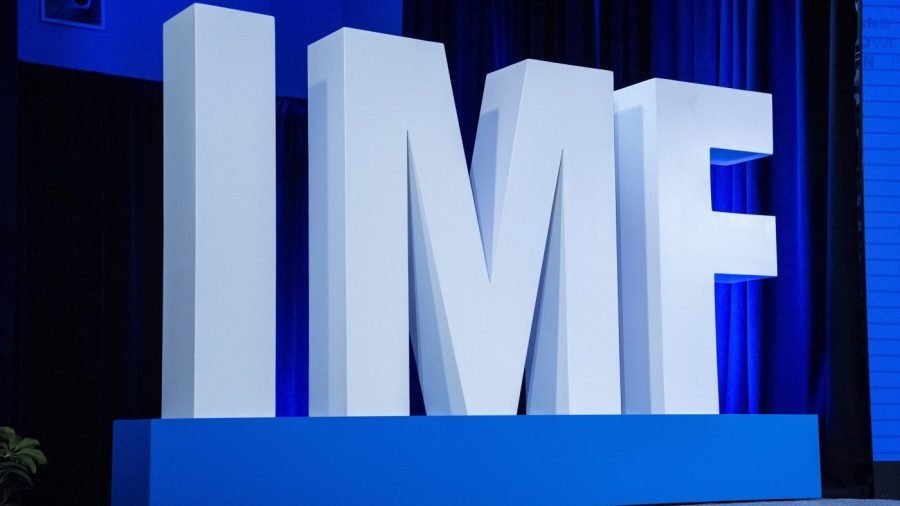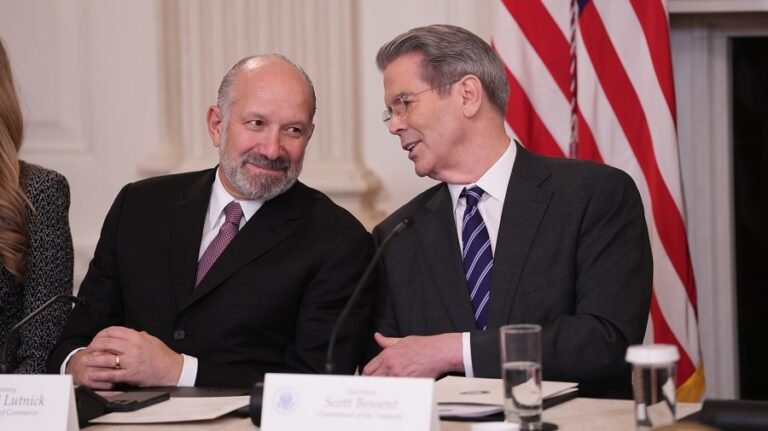
As delegates across the world come to Washington next week for the International Monetary Fund’s Spring Meetings, an issue at the top of their minds will be whether the Trump administration supports the organization. The administration has fairly asked what America gets out of many international organizations, and Project 2025 called for U.S. withdrawal from the IMF.
But the IMF is a fantastic deal for the U.S. It supports vital American interests, strengthens our economy and costs taxpayers nothing. If the U.S. steps back from the IMF, there will only be one winner: China. But the Fund needs to better focus its agenda and get back to basics.
The IMF has long supported American national security. When financial crises have flared, Republican and Democratic administrations turned to the IMF as the world’s first responder. The Reagan and H.W. Bush administrations called on the IMF to tackle Latin debt crises in the 1980s and support reforms in Eastern Europe, especially Poland and the Baltic states, to help free them from Soviet oppression. The Fund was instrumental in responding to the late-1990s Asian crisis. The George W. Bush administration asked the IMF to help tackle the fallout from the global financial crisis, and it was a key player throughout the Eurozone crisis. The Trump administration backed the IMF supporting developing countries during the pandemic.
Today, the Fund is helping countries of significant geopolitical and economic interest to America — including Egypt, Jordan and Ukraine — and it plays a key role in tackling poverty and corruption in many poor countries, including in Africa and our hemisphere. Treasury Secretary Scott Bessent’s recent trip to Buenos Aires to support Argentina’s economic reform program, backed by the IMF, also underscores the Fund’s importance to U.S. interests.
The IMF boosts U.S. economic well-being. When systemic crises happen abroad, they inevitably spill over, harming Americans. A few years ago, Europe — one-fifth of global GDP — was mired in crisis, which would have been worse absent the IMF. During the Asia crisis, turmoil in Thailand, Indonesia and Korea hit demand for U.S. agricultural products such as corn, wheat and soybeans. Even in non-systemic countries, crises hurt citizens, especially the poorest. IMF support makes developing nations more resilient, allowing them to stand on their own feet, reducing the need for U.S. foreign aid.
The IMF is a great financial deal for America. The U.S. is the Fund’s largest shareholder, giving us enormous influence (if not veto power) over key policy and financial decisions. When the IMF engages in its normal lending, it draws from members’ quota lines. For the U.S., that means when we put in one dollar, other countries put in three to four. In return for our dollar, the fund gives us an equivalent interest-bearing claim. Over time, these drawdowns and claims equal out. We derive systemic benefits from our IMF participation at virtually zero cost.
If the U.S. steps back from the IMF, China wins. Our influence allows us to shape the IMF to achieve American priorities. China, though almost 20 percent of the global economy, is the Fund’s third-largest member, with voting power just behind Japan. If the U.S. steps back or even withdraws from the Fund, China’s influence will increase significantly. That would limit the extent to which the IMF could call out bad Chinese practices. We would also have limited or no influence over IMF policies and the countries to which the Fund lends. The IMF would show great deference to Beijing.
But reforms are needed. The global economy constantly evolves and so must the IMF.
The Fund’s job is to support macroeconomic stabilization through sound fiscal, monetary, financial stability and external policies. Other areas — structural reforms, climate, inequality — are also key, but the Fund cannot do all. It must defer to others’ expertise, focus on its core mandate and get back to basics.
Global external imbalances are a constant problem and America, given its fiscal deficits, contributes to them. But others, such as China and Germany, habitually run massive current-account surpluses. China’s heavy state-led industrial-policy model fuels an outsized manufacturing surplus, suppressing consumption at home and sending shockwaves abroad. The IMF must do more to call out global imbalances.
Heroic challenges remain on low-income country debt. These nations often remain deeply indebted due to excessive borrowing, including from China and private-sector creditors. The Fund’s debt analyses should not leave countries mired in high debts and costly interest and principal payments.
While IMF lending garners attention, Fund surveillance of members’ policies, including the U.S., offers a public good. The IMF’s job is to be an umpire. American economic policy is hardly faultless. We should expect and accept critiques of our trade and fiscal policies — and ask for equally sharp critiques of other members’ policies.
The IMF is a great deal for America. It has contributed to decades of unprecedented global prosperity.
It is not perfect and we should focus on needed fixes. But America gains by backing the IMF in fulfilling its vital contributions to our country’s well-being and the global economy.
Meg Lundsager, Elizabeth Shortino and Mark Sobel are former U.S. Treasury International Affairs civil servants who represented the U.S. on the IMF Executive Board.


